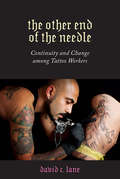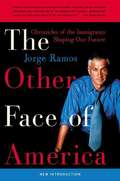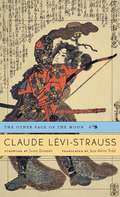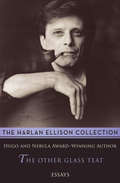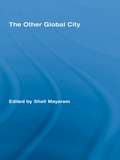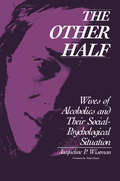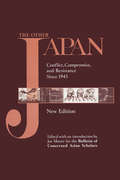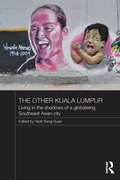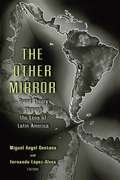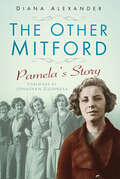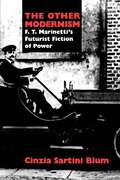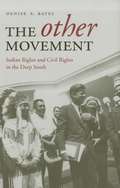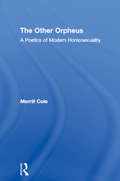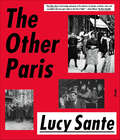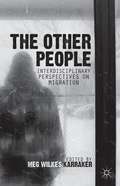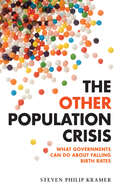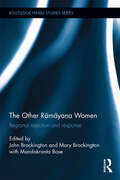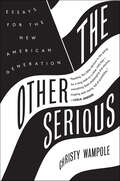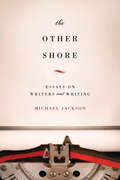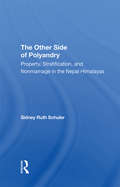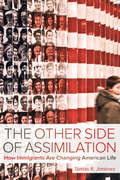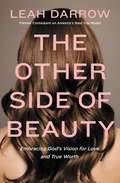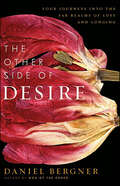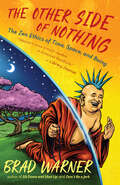- Table View
- List View
The Other End of the Needle: Continuity and Change among Tattoo Workers (Inequality at Work: Perspectives on Race, Gender, Class, and Labor)
by David C. LaneThe Other End of the Needle demonstrates that tattooing is more complex than simply the tattoos that people wear. Using qualitative data and an accessible writing style, sociologist Dave Lane explains the complexity of tattoo work as a type of social activity. His central argument is that tattooing is a social world, where people must be socialized, manage a system of stratification, create spaces conducive for labor, develop sets of beliefs and values, struggle to retain control over their tools, and contend with changes that in turn affect their labor. Earlier research has examined tattoos and their meanings. Yet, Lane notes, prior research has focused almost exclusively on the tattoos—the outcome of an intricate social process—and have ignored the significance of tattoo workers themselves. "Tattooists," as Lane dubs them, make decisions, but they work within a social world that constrains and shapes the outcome of their labor—the tattoo. The goal of this book is to help readers understand the world of tattoo work as an intricate and nuanced form of work. Lane ultimately asks new questions about the social processes occurring prior to the tattoo’s existence.
The Other Face of America
by Jorge RamosImmigrants in America are at the heart of what makes this country the most prosperous and visionary in the world. Writing from his own heartfelt perspective as an immigrant, Jorge Ramos, one of the world's most popular and well-respected Spanish-language television news broadcasters, listens to and explores stories of dozens of immigrants who decided to change their lives and risk everything -- families, jobs, history, and their own culture -- in order to pursue a better, freer, and opportunity-filled future in the United States. In his famously clear voice, Jorge Ramos brings to life the tales of individuals from Mexico, Puerto Rico, Cuba, and the Dominican Republic, among other countries, and explains why they first immigrated, what their dreams are, how they deal with American racism, and what they believe their future in America will hold for them and their children. From the Vieques controversy to the "Spanglish" phenomenon to the explosion of Latino creativity in the arts, Ramos shows that there is a new face in America -- one whose colors and countries of origin are as diverse as the country it has adopted as home.
The Other Face of the Moon
by Claude Levi-StraussGathering for the first time all of Claude Lévi-Strauss’s writings on Japanese civilization, The Other Face of the Moon forms a sustained meditation into the French anthropologist’s dictum that to understand one’s own culture, one must regard it from the point of view of another. Exposure to Japanese art was influential in Lévi-Strauss’s early intellectual growth, and between 1977 and 1988 he visited the country five times. The essays, lectures, and interviews of this volume, written between 1979 and 2001, are the product of these journeys. They investigate an astonishing range of subjects-among them Japan’s founding myths, Noh and Kabuki theater, the distinctiveness of the Japanese musical scale, the artisanship of Jomon pottery, and the relationship between Japanese graphic arts and cuisine. For Lévi-Strauss, Japan occupied a unique place among world cultures. Molded in the ancient past by Chinese influences, it had more recently incorporated much from Europe and the United States. But the substance of these borrowings was so carefully assimilated that Japanese culture never lost its specificity. As though viewed from the hidden side of the moon, Asia, Europe, and America all find, in Japan, images of themselves profoundly transformed. As in Lévi-Strauss’s classic ethnography Tristes Tropiques, this new English translation presents the voice of one of France’s most public intellectuals at its most personal.
The Other Glass Teat: Essays
by Harlan EllisonIn the late 1960s, Harlan Ellison launched a weekly column for the Los Angeles Free Press, where he uncompromisingly discussed the effects of television on modern society. He assaulted everything from television sitcoms to corrupt politicians, talk shows to military massacres. Today, more than four decades later, almost all of his criticism still holds true. Open Road and Edgeworks Abbey, Ellison's company, are proud to make this second volume of fifty-two outspoken columns widely available.
The Other Global City (Routledge Advances in Geography)
by Shail MayaramWhat is a Global City? Who authorizes the World Class City? This edited volume interrogates the "global cities" literature, which views the city as a shimmering, financial "global network." Through a historical-ethnographic exploration of inter-ethnic relations in the "other global" cities of Cairo, Beirut, Istanbul, Bukhara, Lhasa, Delhi, Singapore, Kuala Lumpur and Tokyo, the well-known contributors highlight cartographies of the Other Global City. The volume contends that thinking about the city in the longue duree and as part of a topography of interconnected regions contests both imperial and nationalist ways of reading cities that have occasioned the many and particularly violent territorial partitions in Asia and the world.
The Other Half: Wives of Alcoholics and Their Social-Psychological Situation
by Jacqueline WisemanThis current study has emerged from two decades of the author's investigations in related areas: alcoholism and domestic relations. Its canvas is broadly comparative, drawing on interviews and data gathered in the United States and Finland. The domestic drama of The Other Half is played out both in the private scene of the home and the more public scene of the workplace, and against these two differing national backgrounds. Despite the many expected and perceived cultural differences between the countries, the effects of alcoholism on the family are shown to be the same.Dr. Wiseman's study offers theoretical insights gleaned from its perspective on alcoholism as an interactive phenomenon,to which the concepts of G.H. Mead and Blumer can be applied to illuminate the carefully presented data and go beyond them. New terrain in studies of alcoholism is thereby explored, including such themes as the social construction by the subjects of their husbands' drinking, their marriage and their self-images; the strategy of coping mechanisms; and the effects of the crisis of alcoholism on gender, sex roles, and power differentials.The Other Half complements Dr. Wiseman's prize-winning work on the treatment of Skid Row alcoholics, Stations of the Lost, while involving issues of greater complexity on both the methodological and theoretical plane.
The Other Japan: Democratic Promise Versus Capitalist Efficiency, 1945 to the Present (Japan In The Modern World Ser.)
by Joe MooreThe analyses and literary portraits in this text elucidate the existing realities of Japan's postwar history. They address, in chronological fashion, major social, environmental, and feminist issues and conflicts that have attended to Japan's postwar economic miracle.
The Other Kuala Lumpur: Living in the Shadows of a Globalising Southeast Asian City (Routledge Malaysian Studies Series)
by Yeoh Seng GuanKuala Lumpur, like many Southeast Asian cities, has changed very significantly in the last two or three decades – expanding its size, and 'modernising' and 'globalising' its built environment. For many people these changes represent 'progress' and 'development'. This book, however, focuses on the more marginalised residents of Kuala Lumpur. Among others, it considers street hawkers and vendors, refugees, the urban poor, religious minorities and a sexuality rights group, and explores how their everyday lives have been adversely affected by these recent changes. The book shows how urban renewal, the law and ethno-religious nationalism can work against these groups in wanting to live and work in the capital city of Malaysia.
The Other Mirror: Grand Theory through the Lens of Latin America
by Miguel Angel Centeno & Fernando López-AlvesIf social science's "cultural turn" has taught us anything, it is that knowledge is constrained by the time and place in which it is produced. In response, scholars have begun to reassess social theory from the standpoints of groups and places outside of the European context upon which most grand theory is based. Here a distinguished group of scholars reevaluates widely accepted theories of state, property, race, and economics against Latin American experiences with a two-fold purpose. They seek to deepen our understanding of Latin America and the problems it faces. And, by testing social science paradigms against a broader variety of cases, they pursue a better and truly generalizable map of the social world. Bringing universal theory into dialogue with specific history, the contributors consider what forms Latin American variations of classical themes might take and which theories are most useful in describing Latin America. For example, the Argentinian experience reveals the limitations of neoclassical descriptions of economic development, but Charles Tilly's emphasis on the importance of war and collective action to statemaking holds up well when thoughtfully adapted to Latin American situations. Marxist structural analysis is problematic in a region where political divisions do not fully expresses class cleavages, but aspects of Karl Polanyi's socioeconomic theory cross borders with relative ease. This fresh theoretical discussion expands the scope of Latin American studies and social theory, bringing the two into an unprecedented conversation that will benefit both. Contributors are, in addition to the editors, Jeremy Adelman, Jorge I. Domínguez, Paul Gootenberg, Alan Knight, Robert M. Levine, Claudio Lomnitz, John Markoff, Verónica Montecinos, Steven C. Topik, and J. Samuel Valenzuela.
The Other Mitford: Pamela's Story
by Jonathan Guinness Diana AlexanderPamela Jackson, née Mitford, is perhaps the least well known of the illustrious Mitford sisters, and yet her story is just as captivating, and more revealing. Despite shunning the bright city lights that her sisters so desperately craved, she was very much involved in the activities of her extraordinary family, picking up the many pieces when things went disastrously wrong – which they so often did. Joining her sisters on many adventures, including their meeting with Adolf Hitler in Nazi Germany, Pamela quietly observed the bizarre, funny and often tragic events that took place around her. Through her eyes, we are given a view of the Mitfords never seen before. ‘Loyal to the core,’ she possessed ‘the constancy and kindness that underpinned the wilder exploits of the Mitford family. Indeed, innocence, along with courage and kindness, was one of her remarkable qualities. But it was the innocence of a woman who had lived and suffered, loved and lost, and overcome adversity’. Journalist Diana Alexander, who was Pamela’s friend for many years, here reveals the unknown Mitford, or, as her lifelong admirer John Betjeman described her, ‘Gentle Pamela’.
The Other Modernism: F. T. Marinetti's Futurist Fiction of Power
by Cinzia Sartini BlumDrawing on recent feminist and psychoanalytic criticism, Cinzia Sartini Blum provides the first analysis of the rhetoric, politics, and psychology of gender in the avant-garde writings of the Italian Futurist F.T. Marinetti. Her book explores the relations between the seemingly unrelated goals of Italian Futurism: technical revolution, espousal of violence, avowed misogyny, and rejection of literary tradition.Blum argues for the centrality of the rhetoric of gender in Marinetti's work. She also investigates a diverse array of his futurist textual practices that range from formal experimentation with "words in freedom" to nationalist manifestos that advocate intervention in World War I and anticipate subsequent fascist rhetoric of power and virility. A major contribution to the study of the twentieth-century avant-garde and the first full-length study of Marinetti in English, The Other Modernism will interest all those concerned with twentieth-century literature, culture, and society and the problem of modern subjectivity.
The Other Mother: A Lesbian's Fight for Her Daughter
by Nancy AbramsOn a spring day in 1993, Nancy Abrams helped her daughter dress for day care, packed her lunch, and said good-bye. Next she drove to court, where she learned that in the eyes of the law she was nothing more than "a biological stranger'" to the child she helped bring into the world and raise. That was the last time she would see her daughter or hear her voice for five years. The Other Mother begins as Abrams and her female lover decide to begin a family together. With giddy anticipation, they search for a sperm donor, shop for baby clothes and crib, and attend childbirth classes. But despite their high hopes, the relationship begins to fall apart, and they separate when their daughter is a toddler. Problems between the two intensify until, shortly before her daughter's fifth birthday, Abrams loses custody. In unprecedented depth, Abrams's compelling narrative examines the social, legal, and political implications of gay and lesbian parenting. Her haunting memoir asks the question, "What makes a mother?" It is a question that biological parents, co-parents, adoptive parents, step-parents, and divorced parents must each answer in their own way. In telling one woman's story, The Other Mother makes a solid case for legal protections, including marriage, for lesbian and gay families.
The Other Movement: Indian Rights And Civil Rights In The Deep South
by Denise E. BatesThe Other Movement: Indian Rights and Civil Rights in the Deep South examines the most visible outcome of the Southern Indian Rights Movement: state Indian affairs commissions. In recalling political activism in the post-World War II South, rarely does one consider the political activities of American Indians as they responded to desegregation, the passing of the Civil Rights Acts, and the restructuring of the American political party system. Native leaders and activists across the South created a social and political movement all their own, which drew public attention to the problems of discrimination, poverty, unemployment, low educational attainment, and poor living conditions in tribal communities. While tribal-state relationships have historically been characterized as tense, most southern tribes-particularly non-federally recognized ones-found that Indian affairs commissions offered them a unique position in which to negotiate power. Although individual tribal leaders experienced isolated victories and generated some support through the 1950s and 1960s, the creation of the intertribal state commissions in the 1970s and 1980s elevated the movement to a more prominent political level. Through the formalization of tribal-state relationships, Indian communities forged strong networks with local, state, and national agencies while advocating for cultural preservation and revitalization, economic development, and the implementation of community services. This book looks specifically at Alabama and Louisiana, places of intensive political activity during the civil rights era and increasing Indian visibility and tribal reorganization in the decades that followed. Between 1960 and 1990, U. S. census records show that Alabama's Indian population swelled by a factor of twelve and Louisiana's by a factor of five. Thus, in addition to serving as excellent examples of the national trend of a rising Indian population, the two states make interesting case studies because their Indian commissions brought formerly disconnected groups, each with different goals and needs, together for the first time, creating an assortment of alliances and divisions.
The Other Orpheus: A Poetics of Modern Homosexuality (Literary Criticism and Cultural Theory)
by Merrill ColeFirst published in 2003. Routledge is an imprint of Taylor & Francis, an informa company.
The Other Paris
by Lucy Sante“The Other Paris is both eulogy and paean to the matrixes of anarchy, creativity, crime, and serendipity that once gave shape to the City of Light.” —Anna Wiener, The New RepublicParis, the City of Light, the city of fine dining and seductive couture and intellectual hauteur, was until fairly recently always accompanied by its shadow: the city of the poor, the outcast, the criminal, the eccentric, the willfully nonconforming. In The Other Paris, Lucy Sante gives us a panoramic view of that second metropolis, which has nearly vanished but whose traces are in the bricks and stones of the contemporary city, in the culture of France itself, and, by extension, throughout the world. Drawing on testimony from a great range of witnesses—from Balzac and Hugo to assorted boulevardiers, rabble-rousers, and tramps—Sante, whose thorough research is matched only by the vividness of her narration, takes the reader on a whirlwind tour. Richly illustrated with more than three hundred images, The Other Paris scuttles through the knotted streets of pre-Haussmann Paris, through the improvised accommodations of the original bohemians, through the whorehouses and dance halls and hobo shelters of the old city.A lively survey of labor conditions, prostitution, drinking, crime, and popular entertainment, and of the reporters, réaliste singers, pamphleteers, and poets who chronicled their evolution, The Other Paris is a book meant to upend the story of the French capital, to reclaim the city from the bons vivants and the speculators, and to hold a light to the works and lives of those expunged from its center by the forces of profit.“A wonderfully rich book.” —Allan Massie, The Wall Street Journal
The Other People
by Wilkes KarrakerThis book offers an interdisciplinary and accessible approach to issues of global migration in the twenty-first century in 13 essays plus an appendix written by scholars and practitioners in the field.
The Other Population Crisis: What Governments Can Do about Falling Birth Rates
by Steven Philip KramerIn many developed countries, population decline poses economic and social strains and may even threaten national security. Through historical-political case studies of Sweden, France, Italy, Japan, and Singapore, The Other Population Crisis explores the motivations, politics, programming, and consequences of national efforts to promote births. Steven Philip Kramer finds a significant government role in stopping declines in birth rates. Sweden’s and France’s pro-natalist programs, which have succeeded, share the characteristics of being universal, not means-tested, and based on gender equality and making it easy for women to balance work and family. The programs in Italy, Japan, and Singapore, which have failed so far, have not devoted sufficient resources consistently enough to make a difference and do not support gender equality and women’s work-family balance, Kramer finds.
The Other Ramayana Women: Regional Rejection and Response (Routledge Hindu Studies Series)
by John Brockington and Mary BrockingtonThis book is the first to present current scholarship on gender and in regional and sectarian versions of the Rāmāyaṇa. Contributors explore in what ways the versions relate to other Rāmāyaṇa texts as they deal with the female persona and the cultural values implicit in them. Using a wide variety of approaches, both analytical and descriptive, the authors discover common ground between narrative variants even as their diversity is recognized. It offers an analysis in the shaping of the heterogeneous Rāma tradition through time as it can be viewed from the perspective of narrating women's lives. Through the analysis of the representation and treatment of female characters, narrative inventions, structural design, textual variants, and the idiom of composition and technique in art and sculpture are revealed and it is shown what and in which way these alternative versions are unique. A sophisticated exploration of the Rāmāyaṇa, this book is of great interest to academics in the fields of South Asian Studies, Asian Religion, Asian Gender and Cultural Studies.
The Other Serious: Essays for the New American Generation
by Christy WampoleAn original collection of incandescent cultural criticism, both experimental and personal, full of pragmatic advice for how to live a considered, joyful existence in our era of screen living and hipster irony, by a Gen-X Princeton professor and contributor to The New York TimesThe essays in The Other Serious examine the signature phenomena of our moment: the way our lives contradict themselves, how exaggeration and excess seep into our collective subconscious, why gender is becoming more rather than less complicated, and how we interact with the material things that surround us. It is a book about the delicacy and bluntness of American life, about how pop culture sticks its finger deeply into the ethical dilemmas of our time, and how to negotiate between the old and the new, the high and the low, the global and the local, the sacred and the profane. At the heart of these reflections lies a central question: What should you do when you don't know what to do?Taken together, these essays comprise a guide for the overhaul of "the administrativersity" of contemporary American life, a bureaucratic prison where the brain needn't work anymore. These pieces investigate the writer's own way of thinking—putting forth new ideas, questioning them, and urging the reader to adopt the same spirit of critical reexamination.
The Other Shore
by Michael JacksonIn this book, ethnographer and poet Michael Jackson addresses the interplay between modes of writing, modes of understanding, and modes of being in the world. Drawing on literary, anthropological and autobiographical sources, he explores writing as a technics akin to ritual, oral storytelling, magic and meditation, that enables us to reach beyond the limits of everyday life and forge virtual relationships and imagined communities. Although Maurice Blanchot wrote of the impossibility of writing, the passion and paradox of literature lies in its attempt to achieve the impossible--a leap of faith that calls to mind the mystic's dark night of the soul, unrequited love, nostalgic or utopian longing, and the ethnographer's attempt to know the world from the standpoint of others, to put himself or herself in their place. Every writer, whether of ethnography, poetry, or fiction, imagines that his or her own experiences echo the experiences of others, and that despite the need for isolation and silence his or her work consummates a relationship with them.
The Other Side Of Polyandry: Property, Stratification, And Nonmarriage In The Nepal Himalayas
by Sidney Ruth SchulerThis book provides demographic data on polyandry and nonmarriage, exploring the social and economic context of nonmarriage and its implications vis-a-vis the position of women in the Nepal. It fills gaps in the literature on Tibetan societies with respect to stratification and the position of women.
The Other Side of Assimilation: How Immigrants Are Changing American Life
by Tomas JimenezThe immigration patterns of the last three decades have profoundly changed nearly every aspect of life in the United States. What do those changes mean for the most established Americans—those whose families have been in the country for multiple generations? The Other Side of Assimilation shows that assimilation is not a one-way street. Jiménez explains how established Americans undergo their own assimilation in response to profound immigration-driven ethnic, racial, political, economic, and cultural shifts. Drawing on interviews with a race and class spectrum of established Americans in three different Silicon Valley cities, The Other Side of Assimilation illuminates how established Americans make sense of their experiences in immigrant-rich environments, in work, school, public interactions, romantic life, and leisure activities. With lucid prose, Jiménez reveals how immigration not only changes the American cityscape but also reshapes the United States by altering the outlooks and identities of its most established citizens.
The Other Side of Beauty: Embracing God's Vision for Love and True Worth
by Leah Darrow“Leah Darrow uses her experience in the beauty industry to help the women of our culture see what true beauty looks like.” —Jennifer Fulwiler, host of The Jennifer Fulwiler Show and author of Something Other than GodDo you feel like you’re never good enough? Like you should be living a more Instagram-worthy life? Are you exhausted by the impossible quest for physical beauty but still yearn for the validation of being chosen, valued, and deemed beautiful?Drawing on her experience on America’s Next Top Model and her work as a fashion model, Leah Darrow exposes the lies we are told about our worth being tied to our appearance and instead invites us to look again at the real meaning of beauty. She shows how we can reclaim true and lasting beauty—the kind that doesn’t depend on self-doubt, exploitation, or comparison—when we reflect God’s glory and embrace our value as he made us to be: strong, brave, and free. Only when we learn to see ourselves as God does can we leave behind our culture’s definitions and demands and find joy in The Other Side of Beauty.
The Other Side of Desire: Four Journeys into the Far Realms of Lust and Longing
by Daniel Bergner“Riveting….Powerful…as much about desire and what’s normal as it is an exploration of why we are the way we are, whether we like it or not.” —New York Times Book ReviewSubtitled “Four Journeys into the Far Realms of Lust and Longing,” Daniel Bergner’s The Other Side of Desire is a literary exploration of science and sex that will appeal to readers of Mary Roach and Natalie Angier. A cross between “a top-rated HBO series [with] provocatively graphic sex, humorous dialogue, and moral ambiguity,” (New York Times) and a profound, deeply humanizing study of sexuality, The Other Side of Desire has been called, “a foray into extreme passion, in quest of the human soul” (O, The Oprah Magazine) and its author, Bergner, “a keen storyteller but above all a humane one” (Salon.com).
The Other Side of Nothing: The Zen Ethics of Time, Space, and Being
by Brad WarnerA reader-friendly guide to Zen Buddhist ethics for modern times In the West, Zen Buddhism has a reputation for paradoxes that defy logic. In particular, the Buddhist concept of nonduality — the realization that everything in the universe forms a single, integrated whole — is especially difficult to grasp. In The Other Side of Nothing, Zen teacher Brad Warner untangles the mystery and explains nonduality in plain English. To Warner, this is not just a philosophical problem: nonduality forms the bedrock of Zen ethics, and once we comprehend it, many of the perplexing aspects of Zen suddenly make sense. Drawing on decades of Zen practice, he traces the interlocking relationship between Zen metaphysics and ethics, showing how a true understanding of reality — and the ultimate unity of all things — instills in us a sense of responsibility for the welfare of all beings. When we realize that our feeling of separateness from others is illusory, we have no desire to harm any creature. Warner ultimately presents an expansive overview of the Zen ethos that will give beginners and experts alike a deeper understanding of one of the world’s enduring spiritual traditions.
